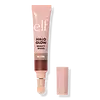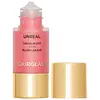What's inside
What's inside
 Key Ingredients
Key Ingredients

 Benefits
Benefits

 Concerns
Concerns

 Ingredients Side-by-side
Ingredients Side-by-side

Water
Skin ConditioningHydrogenated Didecene
Skin ConditioningIsododecane
EmollientSynthetic Fluorphlogopite
Glycerin
HumectantPropylene Glycol
HumectantPEG-10 Dimethicone
Skin ConditioningTrimethylsiloxysilicate
EmollientSqualane
EmollientCetyl PEG/PPG-10/1 Dimethicone
EmulsifyingDimethicone
EmollientIsoamyl Laurate
EmollientHydrogenated Styrene/Isoprene Copolymer
Sodium Chloride
MaskingSynthetic Sapphire
Caprylic/Capric Triglyceride
MaskingPolyglyceryl-4 Isostearate
EmulsifyingPropylene Carbonate
SolventDisteardimonium Hectorite
StabilisingTocopherol
AntioxidantHelianthus Annuus Seed Oil
EmollientCalendula Officinalis Flower Extract
MaskingPolymethylsilsesquioxane
Hydrolyzed Sodium Hyaluronate
Skin ConditioningSodium Hyaluronate
HumectantDisodium EDTA
Triethoxycaprylylsilane
Caprylyl Glycol
EmollientPhenoxyethanol
PreservativeEthylhexylglycerin
Skin ConditioningPentaerythrityl Tetra-Di-T-Butyl Hydroxyhydrocinnamate
AntioxidantIron Oxides
Water, Hydrogenated Didecene, Isododecane, Synthetic Fluorphlogopite, Glycerin, Propylene Glycol, PEG-10 Dimethicone, Trimethylsiloxysilicate, Squalane, Cetyl PEG/PPG-10/1 Dimethicone, Dimethicone, Isoamyl Laurate, Hydrogenated Styrene/Isoprene Copolymer, Sodium Chloride, Synthetic Sapphire, Caprylic/Capric Triglyceride, Polyglyceryl-4 Isostearate, Propylene Carbonate, Disteardimonium Hectorite, Tocopherol, Helianthus Annuus Seed Oil, Calendula Officinalis Flower Extract, Polymethylsilsesquioxane, Hydrolyzed Sodium Hyaluronate, Sodium Hyaluronate, Disodium EDTA, Triethoxycaprylylsilane, Caprylyl Glycol, Phenoxyethanol, Ethylhexylglycerin, Pentaerythrityl Tetra-Di-T-Butyl Hydroxyhydrocinnamate, Iron Oxides
Isoamyl Laurate
EmollientHydrogenated Polydecene
EmollientSynthetic Fluorphlogopite
Diisostearyl Malate
EmollientIsododecane
EmollientOctyldodecanol
EmollientTrimethylsiloxysilicate
EmollientStearalkonium Hectorite
Gel FormingPropylene Carbonate
SolventSorbitan Sesquioleate
EmulsifyingVp/Hexadecene Copolymer
Helianthus Annuus Seed Oil
EmollientDimethicone
EmollientCaprylyl Glycol
EmollientBenzotriazolyl Dodecyl P-Cresol
UV AbsorberEthylhexylglycerin
Skin ConditioningRicinus Communis Seed Oil
Masking1,2-Hexanediol
Skin ConditioningLupinus Albus Seed Extract
Skin ConditioningSorbitan Olivate
EmulsifyingTocopherol
AntioxidantSodium Hyaluronate
HumectantCaproic Acid
CleansingCI 15985
Cosmetic ColorantCI 19140
Cosmetic ColorantCI 45410
Cosmetic ColorantIron Oxides
CI 77891
Cosmetic ColorantIsoamyl Laurate, Hydrogenated Polydecene, Synthetic Fluorphlogopite, Diisostearyl Malate, Isododecane, Octyldodecanol, Trimethylsiloxysilicate, Stearalkonium Hectorite, Propylene Carbonate, Sorbitan Sesquioleate, Vp/Hexadecene Copolymer, Helianthus Annuus Seed Oil, Dimethicone, Caprylyl Glycol, Benzotriazolyl Dodecyl P-Cresol, Ethylhexylglycerin, Ricinus Communis Seed Oil, 1,2-Hexanediol, Lupinus Albus Seed Extract, Sorbitan Olivate, Tocopherol, Sodium Hyaluronate, Caproic Acid, CI 15985, CI 19140, CI 45410, Iron Oxides, CI 77891
 Reviews
Reviews

Ingredients Explained
These ingredients are found in both products.
Ingredients higher up in an ingredient list are typically present in a larger amount.
Caprylyl Glycol is a humectant and emollient, meaning it attracts and preserves moisture.
It is a common ingredient in many products, especially those designed to hydrate skin. The primary benefits are retaining moisture, skin softening, and promoting a healthy skin barrier.
Though Caprylyl Glycol is an alcohol derived from fatty acids, it is not the kind that can dry out skin.
This ingredient is also used as a preservative to extend the life of products. It has slight antimicrobial properties.
Learn more about Caprylyl GlycolDimethicone is a type of synthetic silicone created from natural materials such as quartz.
What it does:
Dimethicone comes in different viscosities:
Depending on the viscosity, dimethicone has different properties.
Ingredients lists don't always show which type is used, so we recommend reaching out to the brand if you have questions about the viscosity.
This ingredient is unlikely to cause irritation because it does not get absorbed into skin. However, people with silicone allergies should be careful about using this ingredient.
Note: Dimethicone may contribute to pilling. This is because it is not oil or water soluble, so pilling may occur when layered with products. When mixed with heavy oils in a formula, the outcome is also quite greasy.
Learn more about DimethiconeEthylhexylglycerin (we can't pronounce this either) is commonly used as a preservative and skin softener. It is derived from glyceryl.
You might see Ethylhexylglycerin often paired with other preservatives such as phenoxyethanol. Ethylhexylglycerin has been found to increase the effectiveness of these other preservatives.
Helianthus Annuus Seed Oil is the oil derived from the seeds of a Sunflower. Sunflower seed oil is non-fragrant. It is an emollient, meaning it helps to soften the skin.
Sunflower seed oil contains many fatty acids. The fatty acids found in sunflower seeds include (from highest amount to least): linoleic acid, myristic acid, palmitic acid, stearic acid, arachidic acid, oleic acid, and linolenic acid.
These fatty acids help the skin create ceramides. Ceramides play a role in repairing the skin barrier.
Helianthus Annuus Seed Oil helps moisturize the skin. This in turn helps the skin look more rejuvenated and smoother.
Sunflowers are rich in vitamin E.
Historians believe Indigenous cultures of North America domesticated sunflowers before corn. Thus they relied on sunflower oil for a variety of uses. One such use is moisturizing skin and hair.
Sunflower seed oil may not be fungal acne safe. We recommend speaking with a professional if you have any concerns.
Learn more about Helianthus Annuus Seed OilIsoamyl Laurate is created from isoamyl alcohol and lauric acid. It is an emollient and traps moisture underneath.
This ingredient helps give products a silky feel and is considered a silicone alternative.
This ingredient may not be fungal acne safe.
Learn more about Isoamyl LaurateIsododecane is a fragrance, emollient, and solvent.
As an emollient, it helps your skin stay soft and hydrated. Emollients help trap moisture into your skin.
Isododecane's role as a solvent makes it a great texture enhancer. It spreads smoothly on skin and does not leave a sticky feeling behind. Isododecane also helps prevent color transfer in makeup products.
Isododecane is not absorbed into skin.
Learn more about IsododecaneThis ingredient is a solvent. It helps dissolve active ingredients and alter the texture of products.
Propylene Carbonate is commonly used in makeup and with clay, such as montmorillonite or bentonite.
Studies show this ingredient to be safe for cosmetics. When it is undiluted, it can cause skin irritation. (It is always diluted in skincare and makeup). This ingredient is water-soluble.
Propylene Carbonate is created from propylene glycol and carbonic acid.
Learn more about Propylene CarbonateSodium Hyaluronate is hyaluronic acid's salt form. It is commonly derived from the sodium salt of hyaluronic acid.
Like hyaluronic acid, it is great at holding water and acts as a humectant. This makes it a great skin hydrating ingredient.
Sodium Hyaluronate is naturally occurring in our bodies and is mostly found in eye fluid and joints.
These are some other common types of Hyaluronic Acid:
Learn more about Sodium HyaluronateSynthetic Fluorphlogopite is the synthethic version of mica. It consists of fluorine, aluminum and silicate.
Synthetic Fluorphlogopite is used to add volume to products.
It is considered non-irritating on the skin.
Learn more about Synthetic FluorphlogopiteTocopherol (also known as Vitamin E) is a common antioxidant used to help protect the skin from free-radicals and strengthen the skin barrier. It's also fat soluble - this means our skin is great at absorbing it.
Vitamin E also helps keep your natural skin lipids healthy. Your lipid skin barrier naturally consists of lipids, ceramides, and fatty acids. Vitamin E offers extra protection for your skin’s lipid barrier, keeping your skin healthy and nourished.
Another benefit is a bit of UV protection. Vitamin E helps reduce the damage caused by UVB rays. (It should not replace your sunscreen). Combining it with Vitamin C can decrease sunburned cells and hyperpigmentation after UV exposure.
You might have noticed Vitamin E + C often paired together. This is because it is great at stabilizing Vitamin C. Using the two together helps increase the effectiveness of both ingredients.
There are often claims that Vitamin E can reduce/prevent scarring, but these claims haven't been confirmed by scientific research.
Learn more about TocopherolThis silicone is an emollient. Emollients create a thin film on the skin to prevent moisture from escaping.
It is not soluble in water and helps increase water-resistance in products.
According to a manufacturer, it can blend seamlessly with silicone oils, such as Cyclopentasiloxane.
Learn more about TrimethylsiloxysilicateThis ingredient is a combination of red, black, and yellow iron oxide pigments. This combination of colors is usually found in foundation, because it results in a "skin" color.